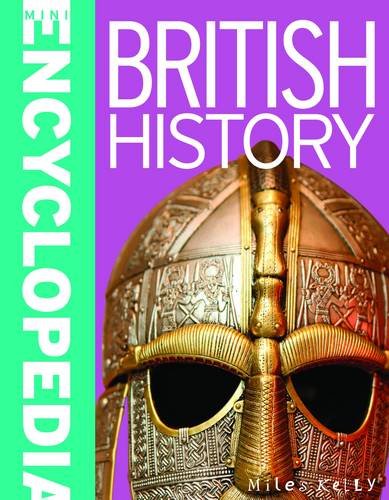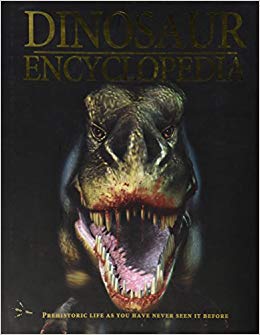-
Mini Encyclopedia - British History
Belinda Gallagher
Paperback (Miles Kelly, Aug. 15, 2015)MINI ENCYCLOPEDIA - BRITISH HISTORY is the mini/pocket book crammed with masses of knowledge about culture, industry and exploration across the British Isles. Interesting bulleted facts for easy understanding. Color-coded sections help children to navigate the book. Brilliantly detailed illustrations and photos support learning. This compact, comprehensive children's encyclopedia uses clear, bulleted facts and incredible info panels to explain everything from Viking raiders to royal rulers and amazing architecture. Every topic is supported by photographs, realistic artwork, maps and detailed diagrams, and color-coded sections make navigation through the topics easy and quick. Timelines are included on every page to document key events over thousands of years. The ultimate British history book for kids, Mini Encyclopedia British History is small enough to slot into school bags, making this a fantastic resource for school projects and homework at key stage 2. Chapters and topic examples of Mini Encyclopedia British History: The Ancient Islands 500,000 700 BC: The Lonely Hunters, The First farmers and Metal and pottery Celts and Romans 700 BC AD 446: Masters of Iron, Roman Invasion and The Fall of Rome Raiders and Settlers AD 446 1066: The Age of Arthur, Saxon Swords, The Making of Scotland, Wales and England Castles and Knights 1066 1509: Hastings 1066, The Feudal System and The Hundred Years War Palaces and Players 1509 1714: A Tudor Palace, The Spanish Armada and Cavaliers and Roundheads A World Power 1714 1901: The House of Hanover, The Napoleonic Wars and The Factory Age The Modern Age 1901 2013: Votes for Women, The Second World War and The Cold War Fascinating facts to spark curious minds: Julius Caesar: The conqueror of the Gauls and southern Britons was one of the most brilliant generals the world has known. Born in about 100 BC , his military campaigns made him the most powerful man in Rome. In August 1348 a new disease appeared at the port of Weymouth, in the southwest of England. It was known as the Pestilence, later as the Black Death. This terrible plague, spread by rats and their fleas, had already devastated Central Asia and Europe. Explorers such as Captain James Cook (1728 1779) opened up the world to the Europeans. Navigators charted unknown coasts and discovered new lands. They made geographical, botanical and other scientific discoveries that brought about a new understanding of the world. M
M
-
Dinosaur Encyclopedia
Igloo
Hardcover (Igloo Books Ltd, March 15, 2006)None
-
The Usborne Book of Peoples of the World: Internet-Linked
Gillian Doherty, Anna Claybourne, Laura Fearn
Paperback (Usborne Books, July 1, 2001)THIS EDITION IS INTENDED FOR USE IN SCHOOLS AND LIBRARIES ONLY. Describes the various people who live in each region of the world, and briefly discusses their religion, food, festivals, ways of making a living, and other things that make them different. L
L
-
Dinosaur Encyclopedia
None
Hardcover (Igloo Books Ltd, )None
-
Encyclopedia of Animals
DK
Paperback (Dorling Kindersley Publishers Ltd, Aug. 3, 2006)Discover the magical world of animals, from Aardvark through to Zebra. Love animals? Come on a journey through the alphabet and find out all about the 2 million species on Earth. Discover why some birds fly, but others don't. Get close to creep crawlies you never knew existed, from meat eaters (yikes) to ones with lots of legs! Or meet the tiny things you can't see, but live closer to you than you might ever imagine! This work includes six sections on each major animal group including mammals, reptiles, creepy crawlies, birds, amphibians and fish. Stunning up-close photography reveals how all kinds of animals and plants live together. It includes fully cross-referenced topics, perfect for homework or projects.
-
Encyclopedia Brown and the Case of the Midnight Visitor
Donald J. Sobol
Library Binding (Paw Prints, May 15, 2008)Solve some more puzzling mysteries with super sleuth Encyclopedia Brown! Leroy Brown is back in the Encyclopedia Brown series. As Idaville?s ten-year-old star detective, Encyclopedia has an uncanny knack for trivia. With his unconventional knowledge, he solves mysteries for the neighborhood kids through his own detective agency. But his dad also happens to be the chief of the Idaville police department, and every night around the dinner table, Encyclopedia helps him solve some of the most baffling crimes. With ten confounding mysteries, not only does Encyclopedia have a chance to solve them, but readers are given all the clues as well and can chime in with their own solutions. Interactive and fun?it?s classic Encyclopedia Brown! P
P
-
The New Encyclopedia Britannica
Inc. Encyclopaedia Britannica
Hardcover (Encyclopedia Britannica, June 30, 2008)This set includes the yearly updates from 2007, 2008 and 2009. This complete set was purchased, taken out of the box and set on the top shelf of a non-smoking home. The publication date of this set is 09-01-2006 for the 2007 edition. O
O
-
Space Encyclopedia
Dorling Kindersley
Hardcover (Ulverscroft Large Print Books, April 1, 2000)Book by
-
Animal Encyclopedia
Dorling Kindersley
Paperback (Dorling Kindersley, March 15, 2008)From aardvark through to zebra, bring your child face-to-face with their favourite animals with this first reference for young animal lovers, now in paperback. Discover all about over 2,000 animals from the largest and the loudest, through to the tallest and smallest. Find out why koalas sleep for nineteen hours; whether all bears can climb trees; and how much a camel can drink in one go. Packed with curiosity quizzes, 'turn and learn' boxes and bite-sized animal facts kids love getting their teeth into, there's lots to see and explore. Go ahead, let your children take a walk into the natural world!
-
Mini Encyclopedia - British Wildlife
Belinda Gallagher
Paperback (PARKWEST PUBLICATIONS, Aug. 15, 2015)MINI ENCYCLOPEDIA - BRITISH WILDLIFE is the mini book crammed with masses of knowledge about the wild animals, birds and flowers around the UK. Interesting bulleted facts for easy understanding. Color-coded sections help children to navigate the book. Brilliantly detailed illustrations and photos support learning. This compact guide includes more than 300 different species, each with a comprehensive overview and a highly detailed illustration with labels. Vital stats, including size and distribution, are presented in a fact panel. Color-coded sections make navigation through the topics easy and quick. A perfect introduction to animal books for kids, Mini Encyclopedia British Wildlife is small enough to slot into school bags, making this a fantastic resource for school projects and homework at key stage 2. Chapters and topic examples of Mini Encyclopedia British Wildlife: Wild Britain: Animals from abroad, Watching wildlife and Wildlife in spring Create a Wildlife Garden Mammals: Hedgehog, Mole and Badger Birds: Cuckoo, Robin, Magpie Amphibians & Reptiles: Adder, Grass snake and Slow worm Freshwater Fish: Carp, Roach and Salmon Minibeasts: Woodlouse, Grasshopper and Ant Wildflowers: Daisy, Ivy and Poppy Trees & Shrubs: Apple, Mulberry and Holly Fascinating facts to enthrall kids: Fulmars defend their nests energetically, and may eject a foul-smelling 'fulmar oil' at persistent intruders. Frogs have long, sticky tongues that they shoot out to catch flies and other insects. Frogs are friends to gardeners as they also eat pests, such as snails and slugs. Dried daisy flowers are used in traditional remedies for treating coughs and colds, diseases of the joints and minor wounds. M
M
-
Encyclopedia Brown and the Case of the Sleeping Dog
Donald J. Sobol, Warren Chang
Library Binding (Paw Prints 2008-04-18, April 18, 2008)Will Wilford Wiggins finally part the kids of Idaville from their hard-earned allowances? Can Encyclopedia stop Sally from belting Bugs Meany into the next millennium? What happens when performance art comes to Idaville? To find the answers--and to solve the mysteries of the sleepy beagle and the shower singers--read the continuing adventures of the world's most famous boy detective! P
P
-
Encyclopedia Brown Solves Them All
Donald J. Sobol, Leonard Shortall
Library Binding (Paw Prints 2008-04-18, April 18, 2008)Leroy Brown is back in the next six books in the Encyclopedia Brown series. As Idaville?s ten-year-old star detective, Encyclopedia has an uncanny knack for trivia. With his unconventional knowledge, he solves mysteries for the neighborhood kids through his own detective agency. But his dad also happens to be the chief of the Idaville police department, and every night around the dinner table, Encyclopedia helps him solve some of the most baffling crimes. With ten confounding mysteries in each book, not only does Encyclopedia have a chance to solve them, but readers are given all the clues as well and can chime in with their own solutions. Interactive and fun?it?s classic Encyclopedia Brown! P
P